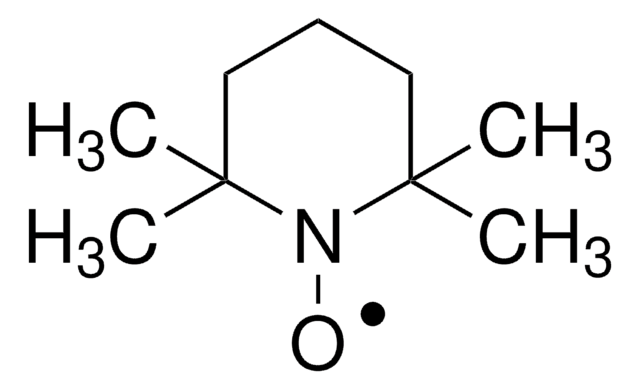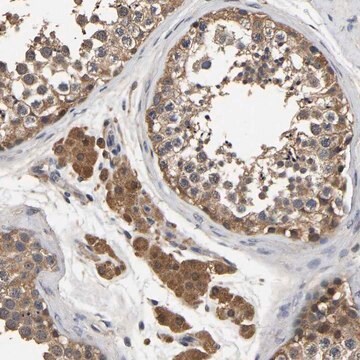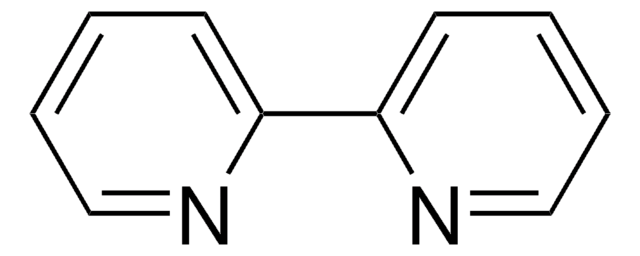SRP6307
BPI from human neutrophils
≥95% (SDS-PAGE)
Sinonimo/i:
BPI, Bacterial/Permeability, CAP57, Increasing Protein
Autenticatiper visualizzare i prezzi riservati alla tua organizzazione & contrattuali
About This Item
Codice UNSPSC:
12352204
NACRES:
NA.32
Prodotti consigliati
Descrizione generale
Bactericidal/permeability increasing protein (BPI) is a 456 residue protein which is part of the innate immune system. BPI was initially identified in neutrophils, but is found in other tissues including the epithelial lining of mucus membranes. It is an endogenous antibiotic protein with potent killing activity against Gram-negative bacteria. It binds to compounds called lipopolysaccharides produced by Gram-negative bacteria. Lipolysaccharides are potent activators of the immune system; however BPI at certain concentrations can prevent this activation. Bacterial/Permeability-Increasing Protein (BPI) is present in the azurophilic granules of polymorphonuclear leukocytes (PMN). BPI is toxic only toward Gram-negative bacteria. This specificity is attributable to the strong attraction of BPI for the lipopolysaccharides (LPS) in the bacterial envelope. BPI is also an important antigen for anti-neutrophil cytoplasmic autoantibodies (ANCA) in vasculitis.
Stato fisico
Frozen in 80 mM Citrate Phosphate, pH 5.6, 0.75 M NaCl.
Codice della classe di stoccaggio
13 - Non Combustible Solids
Classe di pericolosità dell'acqua (WGK)
WGK 3
Punto d’infiammabilità (°F)
Not applicable
Punto d’infiammabilità (°C)
Not applicable
Scegli una delle versioni più recenti:
Certificati d'analisi (COA)
Lot/Batch Number
Non trovi la versione di tuo interesse?
Se hai bisogno di una versione specifica, puoi cercare il certificato tramite il numero di lotto.
Possiedi già questo prodotto?
I documenti relativi ai prodotti acquistati recentemente sono disponibili nell’Archivio dei documenti.
Maria K Magnusson et al.
Inflammatory bowel diseases, 23(6), 956-966 (2017-04-27)
The clinical disease course of ulcerative colitis (UC) varies substantially between individuals and can currently not be reliably predicted. The gut microbiota and the host's immune defense are key players for gut homeostasis and may be linked to disease outcome.
Il team dei nostri ricercatori vanta grande esperienza in tutte le aree della ricerca quali Life Science, scienza dei materiali, sintesi chimica, cromatografia, discipline analitiche, ecc..
Contatta l'Assistenza Tecnica.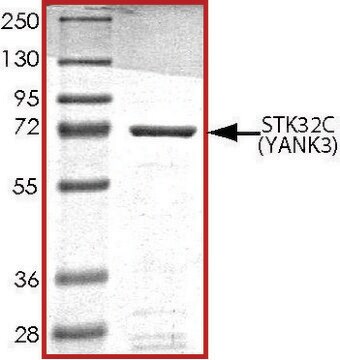
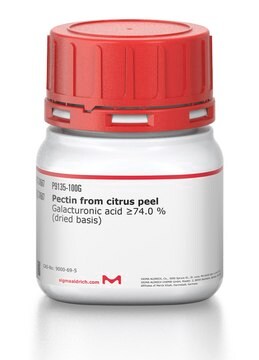
![Sodium tetrakis[3,5-bis(trifluoromethyl)phenyl]borate](/deepweb/assets/sigmaaldrich/product/structures/251/439/7a621e74-bfd1-4a43-833c-09adfcc1e0b3/640/7a621e74-bfd1-4a43-833c-09adfcc1e0b3.png)
